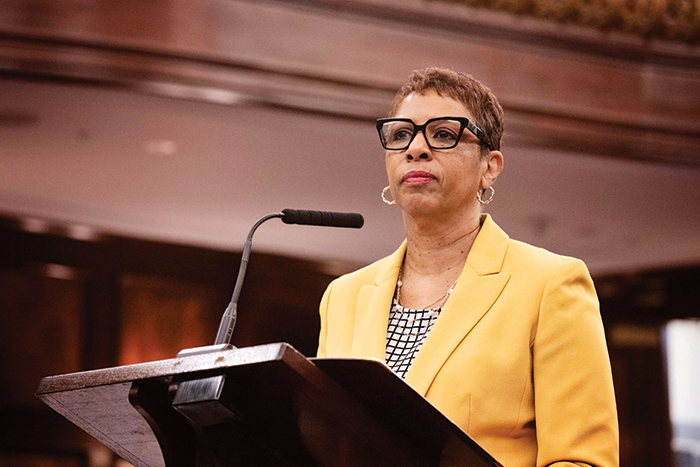Photo Courtesy of John McCarten/NYC Council Media Unit
City Council Speaker Adrienne Adams
By Michael V. Cusenza
The City Council on Thursday passed the “Zero Waste Act,” a package of zero waste legislation that will advance the City’s efforts to divert organic waste from landfills, fight climate change, and create a greener, more sustainable future.
The City’s legislative body also voted in favor of several other pieces of legislation, including bills to increase healthcare costs transparency.
Introduction 244-A, sponsored by Speaker Adrienne Adams and Council Member Shahana Hanif, would establish a permanent citywide residential curbside collection program to divert organic waste. The program requires residents to separate both yard waste and organic waste, such as food scraps, for regular weekly curbside collection by the Department of Sanitation. It will be phased in, with citywide coverage by October 2024. The bill also requires the City to conduct public outreach to residents, building owners, and maintenance staff.
Introduction 274-A, sponsored by Council Member Sandy Nurse, would establish a goal of zero divertible waste for New York City by 2030. The Department of Sanitation would be required to report to the Council if this goal cannot be met.
Introduction 275-A, sponsored by Council Member Sandy Nurse, would require the Department of Sanitation to report on their efforts to increase waste diversion rates. The report must include information on specific materials and their recyclability, and efforts to recycle or reuse materials collected through public litter baskets and other sources.
Introduction 280-B, sponsored by Majority Leader Keith Powers, would require the Department of Sanitation to establish community recycling centers in every borough, to collect materials that are not collected through regular curbside collection but that can be recycled or reused. Information about each facility would be posted online. The bill also requires the Department of Sanitation to submit reports to the Council about the usage of each site.
Introduction 281-B, sponsored by Majority Leader Powers, would require the Department of Sanitation to establish a minimum number of organic waste drop-off sites in each borough, and a minimum number citywide. Information about each drop off site would be posted online. The bill also requires the Department of Sanitation to submit reports to the Council about the usage of each site.
Introduction 844-A, sponsored by Council Member Julie Menin, would establish an Office of Healthcare Accountability. This office would audit city expenditures on employee-related health care costs and make recommendations on how to lower these costs. It would also require creating a website that provides information on the costs of hospital procedures and summarizes the cost transparency of each hospital.
Resolution 512, sponsored by Council Member Julie Menin, calls on the New York State legislature to pass, and the Governor to sign, legislation to create an independent Commission to oversee hospital services pricing for the purpose of increasing access to hospital services, promoting financial stability for hospitals, and lowering healthcare costs for New Yorkers.
Additionally, the council approved several home rule resolutions, including health insurance coverage for surviving spouses or domestic partners of members of the City Fire Department; and including thyroid cancer in the list of cancers presumed to be incurred in the performance of duty for purposes of disability retirement for firefighters in a city with a population of one million or more.
“Our heroes should not have to worry about whether their loved ones will be taken care of after they are gone, or if their illnesses received from on-the-job hazards will be properly recognized,” City Councilwoman Joann Ariola (R-Ozone Park) said.

